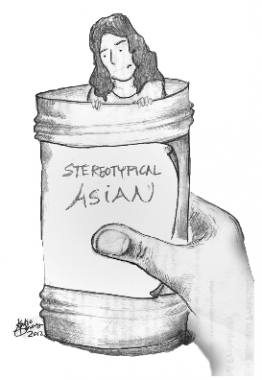By SUSANNA CONINE-NAKANO
When people initially look at me, they automatically assume I am completely Asian, but they are incorrect. My father is Japanese-American while my mother is three-fourths Caucasian and one-fourth Native American, from the Mohawk tribe.
Technically, this means I am multi-racial, although I identify myself as Japanese-American and Caucasian. I feel that society, both in general and in the Asian community, makes me choose only one ethnicity to embrace. There is not a box for being multi-racial and I have to choose only one ethnicity on many surveys and forms. Even though I am presented with multiple options, I wonder which one I should select.
Susanna Conine-Nakano identifies as a Japanese-American because the societal pressure on her to choose one label, although she has a background of several different cultures and races.
By looking Japanese-American and choosing to identify myself as this, people have certain expectations of me — I am expected to be quiet, intelligent, overachieving and disciplined. The term “model minority” is often used for these expectations.
Battle Hymn of a Tiger Mother, written by Amy Chua, gives a glance into the expectations for and among Asians from a Chinese mother’s point of view.
On occasion, I feel like an outsider in my own life because of these expectations. Is it harmful for people to expect me to be intelligent, an overachiever and disciplined? I have found myself fulfilling some of these characteristics and I question whether I should be proud or upset that I have achieved some of the expectations society has placed on me.
People often ask me about my background: “Where are you from?” “Are you adopted?” and “Is English your second language?” Usually, they are attempting to understand who I am.
When I bring Asian food to school, occasionally someone will come up to me ask what I am eating. I don’t mind answering these questions since some have not met many Japanese-Americans. Most are not trying to be stereotypical or judgmental, but it is what society has taught them.
Clarke Central High School is unique because we are so diverse. Some students at CCHS may make assumptions at first, but in my experience they are generally open-minded and that is inspirational.
Many high schools in the U.S. are not as accepting of diversity as we are. This is helping us to move forward as a society by breaking labels on minorities.
More from Susanna Conine-Nakano
